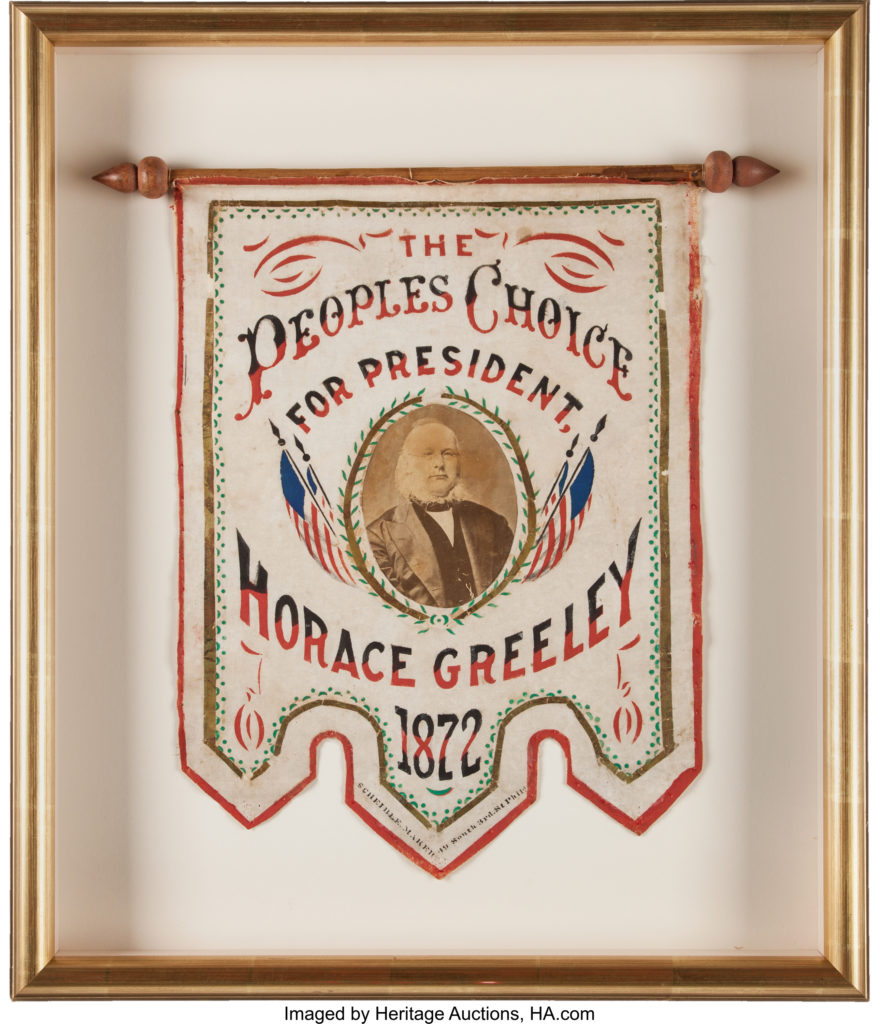
By Jim O’Neal
Many credit the famous 19th century motto of “Go West, young man” to newspaperman Horace Greeley for a line in a July 1865 editorial. However, there is still a debate over whether it was first penned by Greeley or the lesser-known John Soule in an 1851 edition of the Terre Haute (Ind.) Express. Either way, the dictum helped fuel the westward movement of Americans in our quest for Manifest Destiny (“From sea to shining sea”). Clearly, Greeley helped more to popularize the concept due to the great influence of his successful newspaper.
Greeley was much less successful as a politician. He was sent to Congress in 1848 in a special election to represent New York. His colleagues groused that the brief three months he spent there were primarily devoted to exposing Congressional corruption in his newspaper rather than passing legislation. He was unable to generate any meaningful support for re-election, which relegated him back to his real interest, which was reporting on news and exposing crooked politicians.
Despite this setback to his political career, Greeley remained a powerful force in American politics throughout the entire Civil War period and beyond. After exposing the corruption in the first term of the Grant presidency (1868-1872), he found himself in the curious position of being the presidential candidate for both the Democratic Party (which he had opposed on every issue for many years) and the Liberal-Republican Party (which was an offshoot that objected to the corruption).
The 1872 presidential election was especially bitter, with both sides resorting to dirty tricks and making wild allegations against each other. Grant won the Republican nomination unanimously and as the incumbent, chose not to actively campaign. Greeley was a virtual whirlwind, traveling widely and making 20 or more speeches every day. A cynic observed that the problem was it was the wrong message to the wrong audience, but fundamentally, the issue was that Greeley was simply a poor campaigner and Grant was still a very popular president/general.
Grant easily won his re-election bid for a second term with 56 percent of the popular vote and Greeley died on Nov. 29 – just 24 days after the election and before the electoral votes were cast or counted. This is the first and only time a nominee for president of a major party has died during the election process. Grant went on to snag a comfortable 56 electoral votes as the others were spread among several candidates, including three for the deceased Greeley (which were later contested).
Thus ended the life of Horace Greeley (1811-1872), who had been founder and editor of the New-York Tribune, arguably in the top tier of great American newspapers. Established in 1841, it was renamed the New-York Daily Tribune (1842-1866) as its daily circulation exploded to 200,000. Greeley was endlessly promoting utopian reforms such as vegetarianism, agrarianism, feminism and socialism. In 1852-62, the paper retained Karl Marx as its London-based European correspondent to elaborate on his basic tenets of Marxism.
Great Britain had just finished its decennial census, which put the population at precisely 20,959,477. This was just 1.6 percent of the world’s population, but nowhere on the planet was there a more rich or productive group of people. The empire produced 50 percent of the world’s iron and coal, controlled two-thirds of the shipping and accounted for one-third of all trade. London’s banks had more money on deposit than all other financial centers … combined! Virtually all the finished cotton in the world was produced in Great Britain on machines built in Britain by British inventors.
The famous British Empire covered 11.5 million square miles and included 25 percent of the world’s population. By whatever measurement, it was the richest, most innovative and skilled nation known to man, and in London – where he was living the good life – primarily on his friend Friedrich Engels’ money – Marx was still churning out socialist propaganda. He made no attempt to explain that for the first time in history, there was a lot of everything in most people’s lives. Victorian London was not only the largest city in the world, but the only place one could buy 500 different kinds of hammers and a dazzling array of nails to pound on.
While Marxism morphed into Bolshevism, communism and socialism – polluting the economic systems of many hopeful utopians like Greeley – capitalism and the market-based theories of Adam Smith (“the father of modern economics”) quietly crept over America almost unnoticed. Despite the numerous failed examples of socialism in the real world, there will always be a new generation of people wanting to try it.
 JIM O’NEAL is an avid collector and history buff. He is president and CEO of Frito-Lay International [retired] and earlier served as chair and CEO of PepsiCo Restaurants International [KFC Pizza Hut and Taco Bell].
JIM O’NEAL is an avid collector and history buff. He is president and CEO of Frito-Lay International [retired] and earlier served as chair and CEO of PepsiCo Restaurants International [KFC Pizza Hut and Taco Bell].
